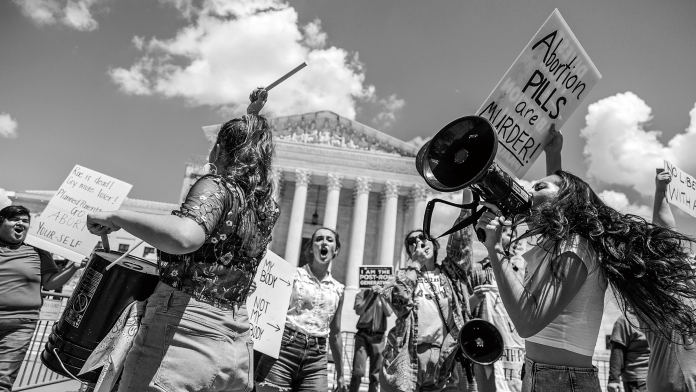Editor’s Note: This article is part of “If Trump Wins,” a project considering what Donald Trump might do if reelected in 2024.
The year 2022 was a triumphant one for the anti-abortion movement. After half a century, the Supreme Court did what had once seemed impossible when it overturned Roe v. Wade, stripping Americans of the constitutional right to terminate a pregnancy. Now movement activists are feeling bolder than ever: Their next goal will be ending legal abortion in America once and for all. A federal ban, which would require 60 votes in the Senate, is unlikely. But some activists believe there’s a simpler way: the enforcement by a Trump Justice Department of a 150-year-old obscenity law.
The Comstock Act, originally passed in 1873 to combat vice and debauchery, prohibits the mailing of any “article or thing” that is “designed, adapted, or intended for producing abortion, or for any indecent or immoral use.” In the law’s first 100 years, a series of court cases narrowed its scope, and in 1971, Congress removed most of its restrictions on contraception. But the rest of the Comstock Act has remained on the books. The law has sat dormant, considered virtually unenforceable, since the Roe v. Wade ruling in 1973.
Following the Supreme Court’s Dobbs v. Jackson Women’s Health Organization decision in 2022, the United States Postal Service asked the Justice Department for clarification: Could its workers legally transport abortion-inducing medications to states with bans? The DOJ replied by issuing a memo stipulating that abortion pills can be legally mailed as long as the sender does not intend for the drugs to be used unlawfully. And whether or not the drugs will be used within the bounds of state law, the memo notes, would be difficult for a sender to know (the pills have medical uses unrelated to abortion).
[From the May 2022 issue: The future of abortion in a post-Roe America]
If Donald Trump is reelected president, many prominent opponents of abortion rights will demand that his DOJ issue its own memo, reinterpreting the law to mean the exact opposite: that Comstock is a de facto ban on shipping medication that could end a pregnancy, regardless of its intended use (this would apply to the USPS and to private carriers like UPS and FedEx). “The language is black-and-white. It should be enforced,” Steven H. Aden, the general counsel at Americans United for Life, told me. A broader interpretation of the Comstock Act might also mean that a person receiving abortion pills would be committing a federal crime and, if prosecuted, could face prison time. Federal prosecutors could bring charges against abortion-pill manufacturers, providers receiving pills in the mail, or even individuals.
The hopes of some activists go further. Their ultimate aim in reviving the Comstock Act is to use it to shut down every abortion facility “in all 50 states,” Mark Lee Dickson, a Texas pastor and anti-abortion advocate, told me. Taken literally, Comstock could be applied to prevent the transport of all supplies related to medical and surgical abortions, making it illegal to ship necessary tools and medications to hospitals and clinics, with no exceptions for other medical uses, such as miscarriage care. Conditions that are easily treatable with modern medicine could, without access to these supplies, become life-threatening.
Legal experts say that the activists’ strategy could, in theory, succeed—at least in bringing the issue to court. “It’s not hypothetical anymore,” Mary Ziegler, a law professor at the UC Davis School of Law, told me. “Because it’s already on the books, and it’s not ridiculous to interpret it this way, [the possibility] is not far-fetched at all.”
Eventually, the Supreme Court would likely face pressure to weigh in. Even though a majority of the Court’s justices have supported abortion restrictions and ruled to overturn Roe, it’s unclear how they’d rule on this particular case. If they were to uphold the broadest interpretation of the Comstock Act, doctors even in states without bans could struggle to legally obtain the supplies they need to provide abortions and perform other procedures.
This is what activists want. The question is whether Trump would accede to their demands. After years of championing the anti-abortion cause, the former president seemed to pivot when he blamed anti-abortion Republicans’ extremism for the party’s poor performance in the 2022 midterm elections (only a small fraction of Americans favors a complete abortion ban). Recently, he’s come across as more moderate on the issue than his primary opponents by condemning Florida’s six-week abortion ban and endorsing compromise with Democrats.
As president, Trump might choose not to enforce Comstock at all. Or he could order his DOJ to enforce it with discretion, promising to go after drug manufacturers and Planned Parenthood instead of individuals. It’s hard to be certain of any outcome: Trump has always been more interested in appeasing his base than reaching Americans in the ideological middle. He might well be in favor of aggressively enforcing the Comstock Act, in order to continue bragging, as he has in the past, that he is “the most pro-life president in American history.”
This article appears in the January/February 2024 print edition with the headline “A Plan to Outlaw Abortion Everywhere.”

















